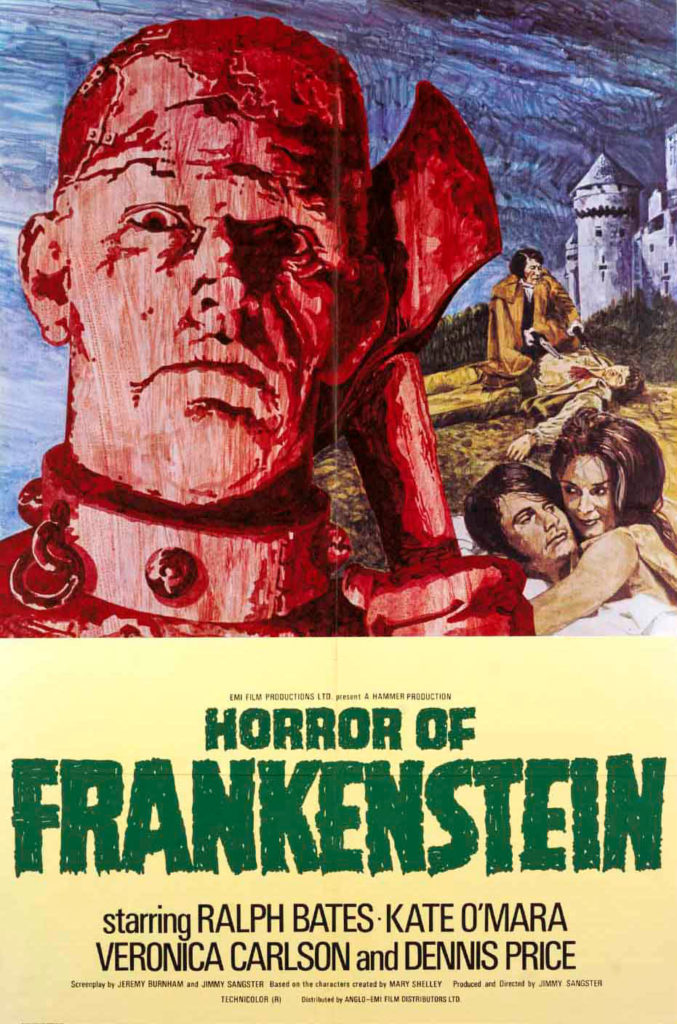So long, Peter Cushing! After five films over 12 years, Hammer decided to go in a different direction with 1970’s The Horror of Frankenstein, replacing the iconic, and aging, Cushing with Ralph Bates, who was an entire generation younger. Hammer also decided not to continue the jumbled and confused continuity of the previous films, going for a complete reboot of the franchise. That phrase, ‘reboot of the franchise,’ is decidedly anachronistic when applied to a film from almost fifty years ago, but it is an accurate description of what Hammer did. It’s just a new term for a practice as old as film itself.
The Horror of Frankenstein appears to have been the personal pet project of Hammer stalwart Jimmy Sangster. Normally a screenwriter only, with this film Sangster not only wrote the screenplay (with Jeremy Burnham), he also produced and directed. If he had the pluck and ego of Orson Welles, maybe he would have starred, as well.
The film begins with young Victor Frankenstein (Bates) showing off his budding sociopathy while tormenting a teacher. We see that this Frankenstein isn’t just the driven striver of films past, or the slightly benevolent scientist, hoping his experiments  will have a long-term benefit for mankind. This Frankenstein, much like Cushing’s portrayal in the previous film, Frankenstein Must Be Destroyed, doesn’t have an ounce of the hero in him.
will have a long-term benefit for mankind. This Frankenstein, much like Cushing’s portrayal in the previous film, Frankenstein Must Be Destroyed, doesn’t have an ounce of the hero in him.
I’m no psychologist, but what I do know of sociopathy seems to be in total display in Frankenstein. He has zero empathy, exists to serve his own appetites, and believes he is superior to all those around him, including those who have much more experience and knowledge. He treats friends and colleagues with an equal amount of disdain, yet while his behavior is full of malice, it doesn’t seem to be hate for hate’s sake. He just regards other people as insignificant. There is nothing that can stop Frankenstein from pursuing his goals, because his goals are paramount. They must be. Since Frankenstein is the greatest person he knows, any interference with his goals is not tolerated, to the point of violence.
Bates had a previous turn in a Hammer film, as Lord Courtley in Taste the Blood of Dracula. Of his performance in that film, I wrote, “There’s barely a line that [Bates] doesn’t speak in his outside voice…the end result is a character who is very punchable.” I didn’t much like Bates in that film. Victor Frankenstein is a much more malicious character than Courtley, so it should follow that I like this performance even less. That’s not so. His previous role was hurt by bombast and overacting. In this role, Bates embodies Victor Frankenstein to an extent similar to Cushing. Bates conveys the coiled tension of the psychopath quite well. As do his fellow cast members. They all walk on eggshells around Frankenstein. He doesn’t treat his friends shabbily until well into the film, but they, and we, pick up on the violence within. Frankenstein always appears to be a man ready to snap at any given moment.
Oh, and there’s a monster. This being a reboot, we see Frankenstein’s experiments from inception to completion. How Sangster carries this out is somewhat rote. There’s nothing unique about the process of creating the monster. It’s just something that has to get done in a Frankenstein film. But in this film more than the others, the monster payoff feels less necessary. Bates and Sangster succeeded in making this film about Frankenstein so completely that it would have been just fine with me had the monster never been reanimated. As it is, the monster was brought to life to wreak a little havoc before the end credits.
In this film, the monster was played by a pre-Clockwork Orange and pre-Star Wars David Prowse. His monster makeup was minimal compared to other Hammer productions, not just other Hammer Frankenstein films, but what makeup there is applied is typically weak. I hate to sound like a broken record, but Hammer just could not get it together when it came to makeup effects. For this film, it looks like Prowse was wearing a flesh colored swimming cap on his head. As for his performance, eh, he was a monster.
The Horror of Frankenstein isn’t the best of the Hammer Frankenstein films. But what is surprising is how the absence of Peter Cushing did not ruin this film. Although lacking the pedigree of Cushing, Bates took this role and ran with it. He was much more interesting than the film as a whole. If a viewer can get past how repellant Frankenstein is as a character in this film, they will be rewarded with a fine performance from the lead.
The film fizzles out in the end, and is marred by some deadly slow spots in the middle. This was Sangster’s first film in the director’s chair. He wasn’t as skilled or reliable as Terence Fisher, but he was good enough to make The Horror of Frankenstein better than any film Freddie Francis directed for this Horrorshow.
